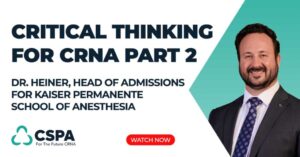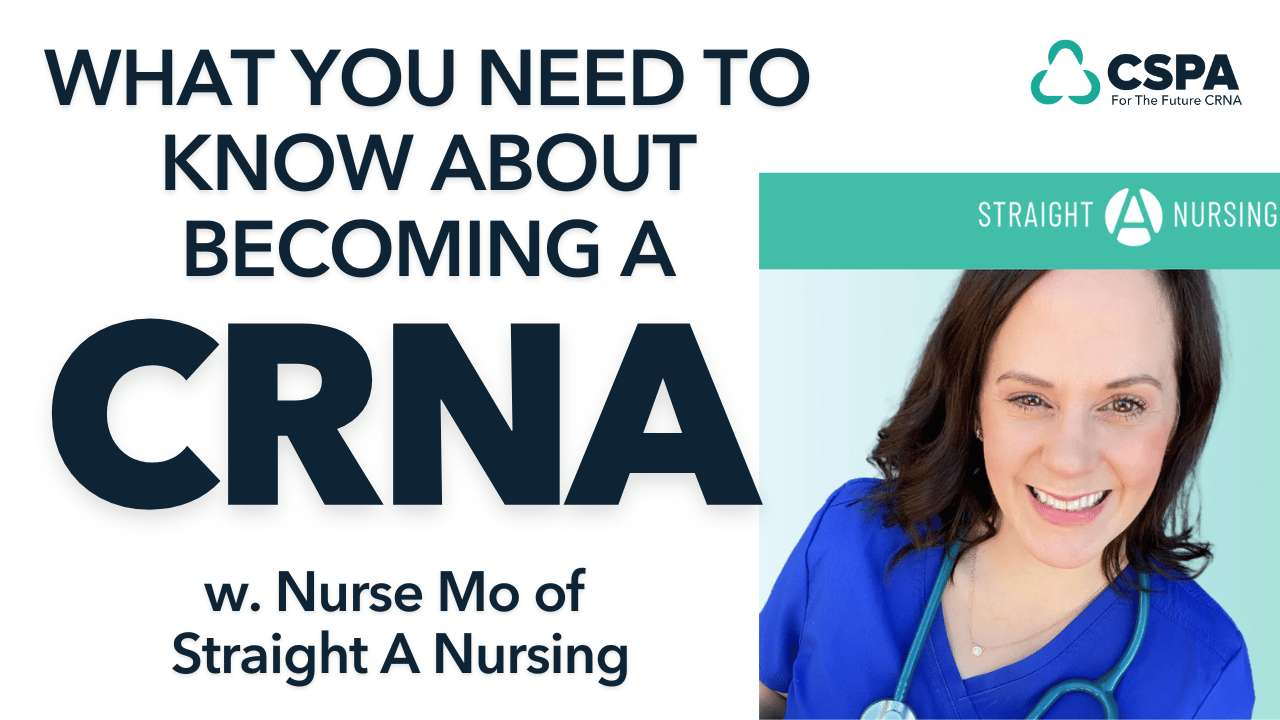
Get Your Free CRNA School Interview Prep Guide
Free CRNA School Interview Prep Guide Click Here
Dr. Jeremy Heiner, EdD, CRNA Head Of Admissions and Program Faculty at Kaiser Permanente School of Anesthesia joins Dr. Richard Wilson for Episode 6 of the Nurse Anesthesia Educators Unplugged Podcast, a podcast exclusively for CRNA School Prep Academy students.
Here’s a sneak peek of their discussion as they tackle the topic of Critical Thinking, including insights into what CRNA admissions committees are looking for when they ask critical thinking questions plus examples of questions that may be asked in your CRNA school interview!
Listen to the full episode inside CRNA School Prep Academy today!
Join CRNA School Prep Academy for Complete Access to This Episode and the Entire Nurse Anesthesia Educators: Unplugged Library PLUS ALL of the Planning & Application Tools, Interview Prep Tools and More That Have Helped Thousands Of Nurses Gain Acceptance Into CRNA School: https://www.crnaschoolprepacademy.com/join
Book a mock interview, personal statement critique, resume review and more at https://www.TeachRN.com
Join the CSPA email list here! https://www.cspaedu.com/podcast-email
Send Jenny an email or make a podcast request!
Hello@CRNASchoolPrepAcademy.com
—
Watch the episode here
Listen to the podcast here
Critical Thinking For CRNA Part 2 With Dr. Heiner, Head Of Admissions For Kaiser Permanente School Of Anesthesia
I have some exciting news to share with you. We have released the Nurse Anesthesia Educators Unplugged, which is going to be your gateway to success. I want you to discover the inside scoop. I want you to be able to navigate the complexities of CRNA admissions and thrive as a candidate and a nurse anesthesia resident, which can seem like a daunting task, but what if you had a trusted guide at your fingertips? This is why we’re excited to introduce the Nurse Anesthesia Educators Unplugged, which is CSPA’s private podcast, your one-stop auditory guide to achieving your CRNA dreams.
Here are the key benefits and features of this private podcast. We will hear directly from the experts, listen to seasoned CRNA faculty members who know the admissions process inside and out, and get invaluable insights, not from the brochures or websites. You’re going to hear from behind the scenes and discover the lesser-known details of the selection process, the traits that faculty look for in candidates, and the hidden pitfalls to avoid.
Knowing that all schools are a little unique, this is going to give you that invaluable insight that’s going to allow you to see the differences between different CRNA programs and the faculty that run these programs. You’re going to hear real stories, hear from successful students who have been in your shoes, and learn about their challenges, strategies, and what made them stand out. You’re going to get strategic advice. Beyond grades, how can you learn to craft a compelling application such as for your essay or your interview responses that will resonate with the admissions teams?
You’re also going to get flexible learning. You can listen to this podcast on your commute, during your workouts, or even while cooking. We want this learning to fit your schedule. You’re going to hear a lot of Q&As on these podcasts. These questions and answers are found in our private CSPA community. We pick questions that are commonly asked by CSPA students and bring them to the table during this faculty podcast. It’s a great way to hear commonly asked questions from a variety of faculty and different insights on that.
We also want you to stay up-to-date. The admissions landscape is always changing. We want to make sure that you’re updated on the latest trends, requirements, and strategies for success. Last but not least, we want to help you build confidence. Knowing what to expect and how to prepare can dramatically increase your confidence, giving you the edge during the application interview process.
I hope this sounds exciting to you. I hope you’re as pumped as I am to tune into these shows. Remember, if you’re a CSPA student, you’re going to have access to this private podcast, but don’t worry. We want to make sure we’re not excluding anyone from this podcast. On occasion, we are going to share sneak peeks with our regular CSPA audiences because I want everyone to succeed.
Whether you’re a CSPA member for twelve months or a short period, you’re going to have access to the entire library of private CSPA faculty podcasts. This is a valuable resource that we are excited to bring to you. I want to lead you to the conclusion that whether or not you’re contemplating a CRNA career or you’re already deep in the application process, the Nurse Anesthesia Educators Unplugged is your secret weapon to equip yourself with the knowledge, strategies, and confidence to stand out. I hope you enjoy the sneak peek. Let’s go ahead and get into the episode.
—
Developing Your Nursing Skill Set
One of my favorite terms is “stretch goals”. I love that phrase because I love the fact that when we talk about setting goals, our goals should be a little bit unrealistic, or at least I think they should be. They should be in the fact that they stretch us beyond our normal and make us do things that we weren’t sure we could ever do. Obviously, I don’t want to put any patient’s safety at risk. That’s not what we’re looking at, but it’s got to get us out of our comfort zone to grow because if not, then I stay who I am that’s what it is.
I love as you talk about those stretch goals and that repetition, but what I love what you’re talking about right there, I’m going to be honest with you, is talking about using these skill sets and developing these skill sets. Not always in the hardest situations, but sometimes in those standard generic or what we consider “simple” situations.
It’s like when we’re teaching students to intubate with bougie in the anesthesia programs. We’re not telling them, “Wait till you get the most difficult airway in the world, and then try to use the bougie.” We’re telling them that on your simple airways, use the bougie, glidescopes, and alternative devices so that you have a comfortability with them. Therefore, it’s taking some of the stress out of it when you are having to use it in difficult emergency situations that are already stressful.
I’m thinking about the ICU settings for our audience here. It’s like the patients who are the “walkie-talkies” or the more stable patients who are in our ICUs. Those patients have a lot to offer. You may not be crashing and figuring out how to titrate levo, epi, vaso, and angiotensin twos all at the same time. It may be that you’re sitting there and you’ve got an arterial line and you have a patient that’s pretty stable.
It’s diving into the critical thinking of, “What all is this arterial line showing me? What is going on with the ventilator? How do I understand what’s going on with this ventilator better now that I have some downtime with a patient who’s stable?” We are not going to always learn that with 1 or 2 patients or whatever are critically sick with a PA catheter, CRRT, or multiple vasoactive substances going on. We can learn with those simple ones.
You can take yourself out of your comfort zone with the simplest patient. There’s always something more to learn. That’s why I say remain curious and never be satisfied because there’s always something more to learn. There is a guy who wrote a couple of books on deliberate practice. His name’s Daniel Coyle. He said a quote that resonated with me.
He said, “There is a place right on the edge of your ability where you learn the best and the fastest. It’s called the sweet spot.” The underlying pattern is the same. Seek out ways to stretch yourself, and play on the edges of your competence. As Albert Einstein once said, “One must develop an instinct for what one can barely achieve through one’s greatest efforts.” The key word there is barely. Constantly remain curious and keep reaching. Small incremental reaches are going to have a large outcome over time.
With learning critical thinking, two things I think of that you have to be open to- You can’t be scared of failure, and feedback from your colleagues. When you become an anesthesia student, you will be getting that daily and you’ll be immersed in deliberate practice. As a student, you deal with that and you should, because that’s part of the process. When you start your anesthesia journey and then you finish it, you’ll be a completely different person. You will think differently because of all the feedback, trials, learning, studying, all the hours in clinical, sleep deprivation, and every experience you have; all of that will accumulate to make you into a CRNA and you will think differently. It is a process, and it’s not something that is going to happen overnight. Good critical thinkers have been doing this for a long time.
We’ve dove a lot into the aspect of how we become a critical thinker in the ICU, what we can focus on, and how we can develop those skill sets. Now, let’s dive into the academics of this because this is what a lot of people going to be interested in.
Critical Thinking and CRNA School Acceptance
When we talk about the admissions process, and you and I got through talking a lot about the admissions process, what’s the committee looking for when they ask these critical care or critical thinking type questions from an applicant when they answer it?
I would say the simplest answer is they’re looking for somebody who can verbalize how to apply concepts and knowledge in a clinical setting. At least from my perspective, I’m not going to ask anything about anesthesia because the people we’re interviewing haven’t learned anesthesia yet. That’s not fair. Asking questions about the ICU is completely fair game because that’s the environment that they work in. We want to see that they can take the different concepts of clinical ICU and apply them to a setting, scenario, or question. That’s what we’re looking at.
There are certain things that you can look for that’ll key you into an interview panel that is trying to evaluate your critical thought process. If they’re asking you questions with the words “who, how, what, when, and where”, then they’re trying to get at statements that are asking for specific information and for you to apply the knowledge you have to that situation.
That’s why we always tell aspiring CRNAs, especially within CSPA, that your preparation in critical thinking and getting into anesthesia school begins on day one when you walk into the ICU and start working in the ICU. These admissions counselors, admission specialists, and panels are going to be able to tell whether you basically are repeating off the Google answer you found last night before you went to bed, before your interview and you were studying it versus the fact that you have that knowledge and are able to apply it within the settings that you are in within your ICUs. There’s a big difference between those two.
CRNA School Interview Questions
Realize that interview panels have heard everything. They’ve heard the same thing over and over. If you can tailor it to your specific experience, that’s going to stand out; if you can apply the knowledge that you’ve learned to yourself as a person and your experiences, that will definitely stand out. That’s what interview panels want to see.
If you can apply the knowledge that you've learned to yourself as a person and your experiences, that will definitely stand out. That's what interview panels want to see. Share on XA couple of examples, do you have some?
Here are a couple of questions that are typical critical thinking-type questions in CRNA school interviews: “When was a time that you learned something new about critical care and how did you apply that knowledge to your clinical practice?” That’s a very general question. You see the when, and how did you apply that? What we want to hear is that you take some piece of information that you either read about in a journal or online. Maybe you were discussing it with some colleagues and then maybe there was a situation where you were able to apply that particular piece of knowledge in a clinical setting.
Here’s an example. You learned about Levophed, titrating it, and the different times to titrate it. Pick an experience of when a patient came in who was severely hypotensive and Levophed was the vasoactive drug that was being used in order to manage that hypotension then talk about how you think that would help the patient or how maybe even the addition of another vasoactive medication would be helpful, how you would go about approaching the ICU attending and potentially adding that other vasoactive medication. There are a variety of ways that you can answer that question, but you want to definitely make it personal to you and to the experiences that you’ve had in the ICU.
—
That sums up the show. Thank you so much for reading. I hope you found that so valuable. I look forward to sharing some more golden nuggets with you in the future. If you’re a CSPA member, there will be an entire section inside the academy that’s labeled Nurse Anesthesia Educators Unplugged Podcast. It will be inside the membership. You log into your membership to have access to this. You can play this on audio whenever you are driving, cooking, folding laundry, or whatever fits your learning style.
We hope you find a lot of value in these episodes, and we’re excited for future episodes to share with you. Until next time, thank you so much for reading. I appreciate you. If the show has been helpful for you and your CRNA journey, I would so very much appreciate it if you were able to share this valuable show with others that you know who are embarking on their CRNA journey. I call it paying it forward.
If this has been a valuable resource for you or a valuable tool on your CRNA journey, I would greatly appreciate it if you were able to share it with someone else down the road. Even if you don’t know anyone, keep us in mind to make sure you send people our way because we want to help you and your peers find success. Cheers to your future. Thank you so much. Until next time, take care.
Important Links
FREE! CRNA School Interview Prep Guide: https://www.cspaedu.com/irptwqbx
Join CRNA School Prep Academy for Complete Access to This Episode and the Entire Nurse Anesthesia Educators: Unplugged Library PLUS ALL of the Planning & Application Tools, Interview Prep Tools and More That Have Helped Thousands Of Nurses Gain Acceptance Into CRNA School: https://www.crnaschoolprepacademy.com/join
Book a mock interview, personal statement critique, resume review and more at https://www.TeachRN.com
Join the CSPA email list: https://www.cspaedu.com/podcast-email
Send Jenny an email or make a podcast request!








